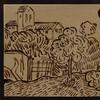Angela Merkel, Bill Gates Attend Opening of Hasso Plattner's Museum Barberini in Potsdam
- POTSDAM, Germany
- /
- January 22, 2017

Over the past three years, a piece of cultural history has been reconstructed in the heart of Potsdam, Germany. On January 23, 2017, the Museum Barberini, Potsdam's new art museum, will open on Alter Markt, the historic center of the city. Under the direction of Dr. Ortrud Westheider, the museum shows exhibitions in international partnerships, presenting individual themes, artists and eras. The collection of Hasso Plattner is the point of departure for these presentations, which range from the Old Masters to works from the 21st century. The collection focuses on Impressionism, American Modern Art, Art from the former East Germany, and painting after 1989.

The Museum Barberini is opening with the exhibitions Impressionism: The Art of Landscape, and Modern Art Classics: Liebermann, Munch, Nolde, Kandinsky. A total of over 170 works will be on display (Jan. 23 – May 28, 2017).
The Museum Barberini was founded on the initiative of SAP cofounder Prof. Dr. h.c. mult. Hasso Plattner. In the past 20 years, he has gathered a collection of East German art and painting after 1989 as well as art historical masterpieces. Impressionist works by Claude Monet and Pierre-Auguste Renoir are represented alongside classic works of American modernism and American abstract art, such as paintings by Max Liebermann, Edward Munch, Joan Mitchel and Gerhard Richter. The collection reflects Hasso Plattner's interest in landscape and abstraction and the ability of art to address all the viewer's senses.
The Museum Barberini presents the donor and patron with a place to display his collection to the public, to make it available for exhibitions, and to promote an exhibition program featuring international partnerships. He has given the responsibility of carrying this out to art historian Ortrud Westheider, who has excellent international contacts. She is planning to hold three rotating shows each year with works from the collection, supplemented by loans from private collections and museums in German and abroad. The collection of the Hasso Plattner Stiftung, with art from the former East Germany and paintings created after 1989, will be shown in dynamic rotating exhibitions.

Furthermore, the work at the Museum Barberini is distinguished by academic exchanges, discussions, events, and digital art education. Regarding the opening of the Museum Barberini, Ortrud Westheider remarked: "I look forward to filling this new place with life. We would like to enable visitors to experience an intense encounter with original artworks, and establish Potsdam as a new center for art history."
Opening exhibition (Jan. 23 – May 28, 2017)
The Museum Barberini opens with two exhibitions that are distinguished by their connection to each other. They position the collection of Hasso Plattner in the context of works from international museums and private collections. The 170 works include international loans from museums such as the Denver Art Museum, the Städel Museum in Frankfurt, the Hermitage in Saint Petersburg, the Israel Museum in Jerusalem and the National Gallery in Washington D.C. as well as international private loans from the USA, France, Switzerland, Great Britain, and the Netherlands.
Impressionism: The Art of Landscape
In the 19th century, Impressionist painters developed an awareness of the present that revolutionized art and continues to permeate events in painting in our time. Although their audience was in Paris and the city itself contained many motifs, landscapes provided the most important subject matter for Claude Monet, Alfred Sisley, Camille Pissarro, and Gustave Caillebotte. Against this backdrop they were able to test new artistic techniques. The exhibition Impressionism: The Art of Landscape examines for the first time the experimental domains found in Impressionist landscapes. Artists depicted the sea, forest paths, meadows, gardens, snowy landscapes, and reflections on the surface of water, addressing all the viewer's senses. The show presents masterpieces in the context of 92 paintings which come from 32 international museums and private collections. They are displayed in thematic sections, showing series of the most important motifs. The exhibition sheds new light on Impressionist artists and their obsession with their own individual perception of light and nature.
Modern Art Classics: Liebermann, Munch, Nolde, Kandinsky
The exhibition Modern Art Classics: Liebermann, Munch, Nolde, Kandinsky focuses on upheavals in painting from modernism to the present day. With 60 paintings and sculptures from a period of 100 years, the show examines issues related to artistic and social emancipation in six sections. Today these works are considered classics of modern art. The exhibition begins in the 1890s and spans the period from German Impressionism through the Fauves to abstract painting after 1945 und highlights the development of painting in the 20th century.
For the exhibition Impressionism: The Art of Landscape a catalog has been published in German and English by Prestel Verlag, Munich. It contains a preface by the museum's founder and patron Hasso Plattner. Essays by Stephen F. Eisenman, Christoph Heinrich, Nancy Ireson, Stefan Koldehoff, Richard Schiff and Ortrud Westheider are based on the first conference held by the Museum Barberini, which took place on June 28, 2016 in Potsdam. 252 pages, € 29.90 (at the museum), € 39.9 (in bookstores).
Museum Barberini in the Barberini Palace
The Hasso Plattner Stiftung is the supporting entity of the non-profit Museum Barberini GmbH. The foundation reconstructed the palace, which was destroyed during the Second World War, as a museum that combines traditional craftsmanship with the latest technology. Under its director Ortrud Westheider, the Museum Barberini shows exhibitions with international partners, and dynamic, rotating presentations of the collection in 17 galleries. The building also houses a shop, a café & restaurant with outdoor seating, and an auditorium for readings, concerts and lectures.
















